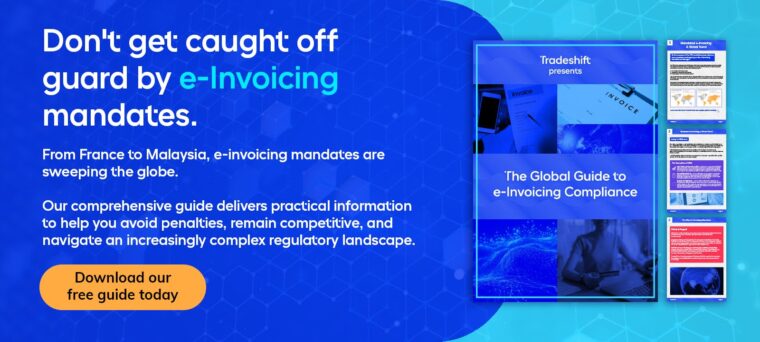ViDA Implementation: What You Need to Know
 Read here the latest news from March 11th, 2025 about ViDA getting adopted by the EU Council.
Read here the latest news from March 11th, 2025 about ViDA getting adopted by the EU Council.
ViDA (VAT in the Digital Age) one of the most important frameworks for digitalisation in the EU
By Ioana Ploesteanu, Product Marketing Manager, Tradeshift
What is ViDA?
ViDA is a significant initiative aimed at modernizing the VAT system within the EU zone to suit the digital economy. It includes a range of measures designed to facilitate cross-border trade, combat VAT fraud, and reduce administrative burdens on businesses.
The ViDA program has 3 currently “pillars” and milestones on the timeline with an expected delayed launch timetable – likely shifting from 2025-2027 to 2026-2030.
The 3 pillars of ViDA (VAT in the Digital Age)
- Digital Reporting Requirements (DRR): This pillar will involve a real-time digital reporting system that facilitates smoother data exchange between businesses and tax authorities. The focus is on generalizing e-invoicing and standardizing the information that businesses need to submit for each transaction with tax authorities.
- Platform Economy Rules: This pillar addresses the challenges of the platform economy, particularly in sectors like short-term accommodation rentals and passenger transport services. ViDA aims to clarify existing VAT rules for these platforms and potentially enhance their role in VAT collection.
- Single EU VAT Registration: This pillar aims to simplify VAT registration for businesses that operate across multiple EU countries. Currently, businesses may need to register for VAT in each country they operate in, which can be a complex and time-consuming process. A single EU VAT registration would streamline this process and reduce administrative burdens.
Original Timetable vs. Current Status of ViDA Implementation
Original Timetable:
- Single VAT Registration & Platform Economy Pillars – Originally 2025
- Digital Reporting Requirements Pillar – Originally 2028
Current Status (as of Match 11th):
- Single VAT Registration Pillar – July 2028
- Platform Economy Pillar – voluntary July 2028, mandatory January 2030
- Digital Reporting & e-Invoicing Pillar – harmonisation January 2035, mandatory July 2030
ViDA Negotiations in 2024: Estonia Blocked ViDA two times
The proposed EU VAT reform package, ViDA (VAT in the Digital Age), faced roadblocks in 2024 as Estonia exercised its veto right. This delays the adoption of the regulation and pushes back key e-invoicing implementation timelines.
- On May 14th, 2024, ViDA was blocked by Estonia which used its veto expressing concern for the second pillar – Platform Economy Rules. The current Belgian Presidency of the EU Council is likely to reattempt an agreement with Estonia by the next ECOFIN (Economic and Financial Affairs Council), 21 June 2024.
- The June 21st, 2024 ECOFIN meeting concluded without an agreement on the VAT in the Digital Age (ViDA) package. Estonia remains opposed to the deemed supplier rules within the proposal, arguing it would unfairly burden small businesses and distort competition, particularly for Estonian SMEs.
- On November 5th Estonia agreed to lift its blocking veto.
Estonia proposed a compromise allowing countries to opt-in to the deemed supplier regime, but this was not accepted. They also highlighted the importance of information gained through DAC7 and expressed concern that taxing small businesses solely on digital platforms could push them towards less transparent methods.
The Hungarian presidency will now continue working on the ViDA file in hopes of reaching a future agreement.
Our take: Standardization, up to a point
One of the central aims of ViDA is to create a common standard for e-invoicing across Europe. Even so, there will be significant differences in how individual countries implement new mandatory e-invoicing regulations.
Filing requirements, timelines and technical specifics will vary significantly from one country to the next. Individual countries will also have different criteria about what data needs to be reported, adding another layer of complexity for organisations operating in multiple jurisdictions.
We’re already seeing these variations crop up in countries such as Romania, Poland and France, where governments are moving ahead with e-invoicing mandates. Businesses should look to partner with a global solution provider capable of navigating this complexity. That’s where we come in.
Tradeshift has a proven process for delivering compliance-as-a-service, and provides customers such as AirFrance, Disneyland Paris, Schaeffler with innovative solutions that support their digital transformation journey and ensure they comply with e-invoicing and tax clearance mandates.
We currently offer compliance-as-a-service for 70 countries, including a streamlined process for complying with tax clearance mandates in 12 countries and e-Invoicing mandates.
Examples of countries with tax clearance or B2B e-invoicing mandates that we support are France, Romania, Malaysia, and Germany with other European and APAC countries on our roadmap.
To ensure compliance excellence, we continually evaluate emerging global regulations and prioritise the inclusion of additional countries in our roadmap.
We’re also the only company offering cross-zone fapiao e-invoicing capabilities in China and among the first to become a registered PDP (PDP immatriculée) in France.
Start sending and receiving compliant e-invoices with Tradeshift
